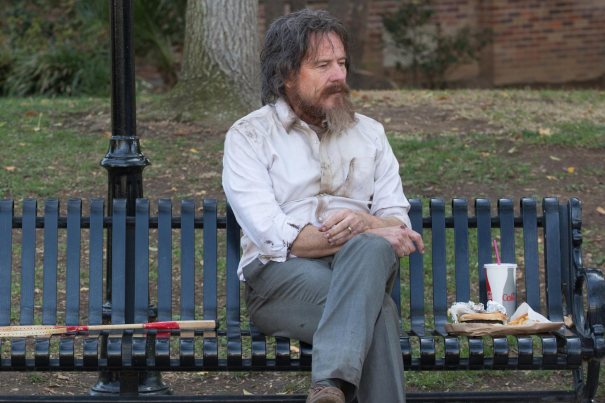
It’s unclear what the motive behind the movie Wakefield is. Not just the characters or the world they exist within, or the film’s “message”, but the reason for its existence. Why did director Robin Swicord, who gained fame for her literary adaptations such as The Curious Case of Benjamin Button and Memoirs of a Geisha, feel the need to write and make this movie? I have a few thoughts, but I’m sure you’re wondering why I’m asking for the purpose behind a film’s creation. Frankly, it’s a question we should ask Hollywood films more often, and more often than not the reason is money. But that’s clearly not the case here because, besides me, I don’t know another human being who has seen this Bryan Cranston starrer which released three weeks ago. Yeah, did you know Bryan Cranston acted in a movie that released three weeks ago? Money could not have been part of the equation. The real reason behind my curiosity is the actual plot and story of the film….
Adapted from a short story by E.L. Doctorrow which in itself is a reimagining of the same story originally written by Nathaniel Hawthorn, Wakefield is about a family man with a city job who comes home late one night after being stuck on a malfunctioning train and follows a racoon loitering through his garbage into what seems like a storage area above his garage… and (take a breath)…. decides to just live there and spy on his family for a whole year.
“What the fuck?” – you right now, probably
Bryan Cranston plays the titular character, Howard Wakefield, a man disillusioned from his monotonous day to life-cycle of wife, kids, and job. He lives in a very upper-class WASP neighborhood, decked with picket fenced McMansions, luxury cars (Wakefield owns a Mercedes), fine china, private-school going children, and Joseph Aboud tailored suits. The need to cutting lose from a daily lifestyle is something a lot of people experience, particularly at Wakefield’s mid-life crisis age. However, instead of the expected trope of blowing off money on expensive things, Wakefield’s crisis takes him into a faux-“survivalist” lifestyle. I say faux- because he technically has food and shelter at his disposal at all times. He’s not ever in any real danger through this whole ordeal.

But the way he enters into this commitment away from his family seems preposterous. Coming home late one night, he notices a raccoon scavenging in the bins on his driveway. In an attempt to shoo the rascal away, he instead sends it up the stairwell in his garage into a storage floor. There, Wakefield notices his wife and kids finishing up dinner without him and… decides to just spend the night. Over the course of a week, he argues with himself over what time would be appropriate to re-introduce himself into his family without it being a gigantic ordeal. Clearly, he supposes, his wife will assume he has been cheating. It’s such a strangely evolved concept that it not only challenges us into identifying with a clearly unlikeable person but also in the idea of what the hell the story is getting at.
Going through E.L. Doctorrow’s short story, written first-person, a marked distinction from Hawthorne’s original which is told as a third-person account, much of the actions Wakefield executes are hardly explained beyond a mere “unknown circumstances” or “can’t imagine why”-s. It’s almost as if this man doesn’t have any control over his mind or body, that he believes fully that his several months in that attic were a literal out of body experience as much as an out of lifestyle experience.
Is Wakefield clinically insane? He talks about the events towards the beginning of the story as having a Doppler effect, or a string of occurrences which seem to prophesize on the collapse of human civilization. He mentions his actions had a snowball effect of irrationality from the first night he spent in the storage area to the following several months. But his constant acknowledgment of his irrational behavior rules that out.

The most logical interpretation of the film’s underlying social themes, in my eyes, is that Wakefield is engaging in a despicable patriarchal power move. One with an heir of complete self-importance in regards to his family. By removing himself from the family, and watching their struggles he finds a sort of sick joy in knowing they can’t handle life without him. He is not so much insane as he is sociopathic. The evidence of this is obvious in several instances where his wife is getting help from a friend on finances, and Wakefield chuckles knowing there’s no way she can afford her lifestyle without his paycheck let alone manage all the monetary budgeting that he and he alone does for the household. Given Swicord’s talent in translating fiction into a visual portrait of multi-dimensional individuals for the screen (her best work, in my opinion, Matilda, takes many moments of a whimsical child’s life and breaths soul-crushing emotional heft into them, quite daring for a children’s movie), her taking a short story to feature length with such a difficult to handle premise was not something I was particularly worried about… but the end result showed that stretching Wakefield as a character leads to many wrong turns and confusingly contradictory portraits of who he is, and why we should accept him as believable.
Much of the second half of the film, a swift turn from the first half, Swicord concentrates on humanizing Wakefield into a compassionate, humble character who ultimately has a self-realizing epiphany. It’s the classic case of a film which steers away from difficult, murky territory of seeing a truly depraved person eaten by his own mind and into a story of glorious self-fulfillment, that too, at the detriment of everyone around him. It’s strange coming from Swicord, who’s writing sensibilities clearly lean towards a feminist reading of the material. Why would she have us believe in this man’s motives as being anything less than a narcissistic act of neglecting three women in his life on a whim? That he is actually capable of learning a lesson and that is what catalyzes his return to society, and not that he is so egotistical, so emotionally distanced from his family as humans with wants and needs, he feels he can waltz back in just like that.
The film would have us believe that by removing himself from everything Wakefield has gained an appreciation for it all… one of the most tired and uninspiring Hollywood lessons. It’s like an American Dad episode written and directed with a straight face.